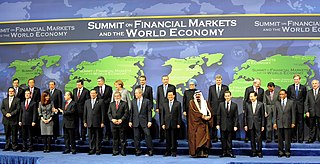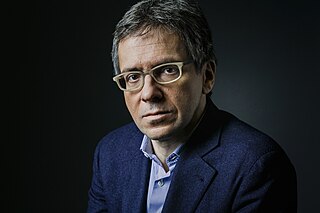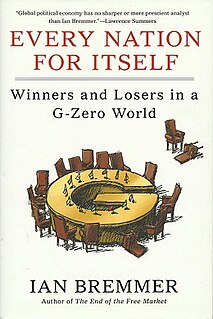
The officially stated goals of the foreign policy of the United States of America, including all the bureaus and offices in the United States Department of State, as mentioned in the Foreign Policy Agenda of the Department of State, are "to build and sustain a more democratic, secure, and prosperous world for the benefit of the American people and the international community". The United States House Committee on Foreign Affairs states as some of its jurisdictional goals: "export controls, including nonproliferation of nuclear technology and nuclear hardware; measures to foster commercial interaction with foreign nations and to safeguard American business abroad; international commodity agreements; international education; and protection of American citizens abroad and expulsion". U.S. foreign policy and foreign aid have been the subject of much debate, praise, and criticism, both domestically and abroad.
Pax Americana is a term applied to the concept of relative peace in the Western Hemisphere and later in the world after the end of World War II in 1945, when the United States became the world's dominant economic and military power.
A superpower is a state with a dominant position characterized by its extensive ability to exert influence or project power on a global scale. This is done through the combined means of economic, military, technological, political and cultural strength as well as diplomatic and soft power influence. Traditionally, superpowers are preeminent among the great powers. While a great power state is capable of exerting its influence globally, superpowers are states so influential that no significant action can be taken by the global community without first considering the positions of the superpowers on the issue.
In politics, soft power is the ability to co-opt rather than coerce. In other words, soft power involves shaping the preferences of others through appeal and attraction. A defining feature of soft power is that it is non-coercive; the currency of soft power includes culture, political values, and foreign policies. In 2012, Joseph Nye of Harvard University explained that with soft power, "the best propaganda is not propaganda", further explaining that during the Information Age, "credibility is the scarcest resource".

A great power is a sovereign state that is recognized as having the ability and expertise to exert its influence on a global scale. Great powers characteristically possess military and economic strength, as well as diplomatic and soft power influence, which may cause middle or small powers to consider the great powers' opinions before taking actions of their own. International relations theorists have posited that great power status can be characterized into power capabilities, spatial aspects, and status dimensions.

In international relations, a middle power is a sovereign state that is not a great power nor a superpower, but still has large or moderate influence and international recognition.
The term "new world order" refers to a new period of history evidencing dramatic change in world political thought and the balance of power in international relations. Despite varied interpretations of this term, it is primarily associated with the ideological notion of world governance only in the sense of new collective efforts to identify, understand, or address global problems that go beyond the capacity of individual nation-states to solve.

Nouriel Roubini is an international economist. He is Professor Emeritus (2021-present), Professor of Economics (1995-2021), Stern School of Business, New York University and also chairman of Roubini Macro Associates LLC, an economic consultancy firm.

The American Century is a characterization of the period since the middle of the 20th century as being largely dominated by the United States in political, economic, and cultural terms. It is comparable to the description of the period 1815–1914 as Britain's Imperial Century. The United States' influence grew throughout the 20th century, but became especially dominant after the end of World War II, when only two superpowers remained, the United States and the Soviet Union. After the dissolution of the Soviet Union in 1991, the United States remained the world's only superpower, and became the hegemon, or what some have termed a hyperpower.

The Harmonious Society is a socioeconomic concept in China that is recognized as a response to the increasing alleged social injustice and inequality emerging in mainland Chinese society as a result of unchecked economic growth, which has led to social conflict. The governing philosophy has therefore shifted around economic growth to overall societal balance and harmony. Along with a moderately prosperous society, it was set to be one of the national goals for the ruling vanguard Communist Party.
"The Japan That Can Say No: Why Japan Will Be First Among Equals" is a 1989 essay originally co-authored by Shintaro Ishihara, the then Minister of Transport and leading LDP figure who would become governor of Tokyo (1999-2012); and Sony co-founder and chairman Akio Morita, in the climate of Japan's economic rise.

Eurasia Group is a political risk consultancy founded in 1998 by Ian Bremmer.

Ian Arthur Bremmer is an American political scientist and author with a focus on global political risk. He is the president and founder of Eurasia Group, a political risk research and consulting firm with principal offices in New York City. He is also a founder of the digital media firm GZERO Media.

Wolfowitz Doctrine is an unofficial name given to the initial version of the Defense Planning Guidance for the 1994–99 fiscal years published by US Under Secretary of Defense for Policy Paul Wolfowitz and his deputy Scooter Libby. Not intended for public release, it was leaked to the New York Times on March 7, 1992, and sparked a public controversy about U.S. foreign and defense policy. The document was widely criticized as imperialist, as the document outlined a policy of unilateralism and pre-emptive military action to suppress potential threats from other nations and prevent dictatorships from rising to superpower status.

Noam Chomsky is an intellectual, political activist, and critic of the foreign policy of the United States and other governments. Noam Chomsky describes himself as an anarcho-syndicalist and libertarian socialist, and is considered to be a key intellectual figure within the left wing of politics of the United States.

The J Curve: A New Way to Understand Why Nations Rise and Fall is a book by political scientist Ian Bremmer. It was named a "Book of the Year" in 2006 by The Economist.
Political risk is a type of risk faced by investors, corporations, and governments that political decisions, events, or conditions will significantly affect the profitability of a business actor or the expected value of a given economic action. Political risk can be understood and managed with reasoned foresight and investment.

A potential superpower is a state or a political and economic entity that is speculated to be—or to have the potential to soon become—a superpower.

Every Nation for Itself: Winners and Losers in a G-Zero World is a 2012 non-fiction book by Ian Bremmer that explains the growing "G-Zero" power vacuum in international politics as no country or group of countries has the political and economic leverage to drive an international agenda or provide global public goods. The book gives a historical summary of the global political order and American role in world affairs from the post-World War II establishment of the Bretton Woods system up through the present day. It outlines the various tolls that the G-Zero will exact, potential winners and losers in such an environment, and makes predictions as to what kind of political order will succeed the G-Zero.

Angela E. Stent is a foreign policy expert specializing in US and European relations with Russia and Russian foreign policy. She is Professor of Government and Foreign Service at Georgetown University and director of its Center for Eurasian, Russian, and East European Studies. She is also a non-resident senior fellow at the Brookings Institution. She has served in the Office of Policy Planning in the US State Department and as National Intelligence Officer for Russia and Eurasia.














